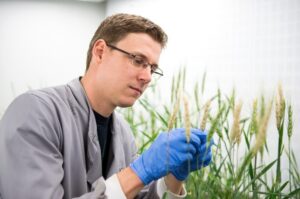9th Online Seminar – Fungal Pathogens (postponed)

The CONNECTED Network Team would like to pass on our huge apologies to anyone who tried to join this seminar. Unfortunately it was hacked and we had to stop the event halfway through.
We appreciate this must have been upsetting to all attendees and we will do our very best to ensure it never happens again. The seminar will be rescheduled soon so you will not miss out on these two excellent talks.
Thursday 15th December 2022
10.30am to 12.00pm GMT (Please check time zone differences)
Our Speakers
Prof Sarah Jane Gurr, University of Exeter (UK) and Utrecht University (Netherlands)
Food, famine and fungi

Sarah Gurr holds the Chair in Food Security at Exeter University. She was a curator of the Oxford Botanic Garden for 21 years and has held a range of distinguished positions including President of The British Society of Plant Pathology (2011) and Advisor to The Scottish Government on Plant Health (RESAS, 2018 -). She is a Fellow of The Royal Botanic Gardens, Kew and The James Hutton Institute, Dundee, and was awarded an Honorary Doctorate by SLU Uppsala (2020).
Her interest is in plant disease – with particular emphasis on fungal infestations and in their global movement and control. Sarah has been invited to speak about this work all over the world – in plenary and keynote conference lectures, and on national and international radio. She has authored or co-authored over 180 publications and holds 6 patents as inventor or co-inventor. In 2019, she was listed amongst the most highly cited researchers worldwide (Clarivate Analytics).
Dr Neil Brown, University of Bath, UK
Fusarium Head Blight: An increasing threat to our food security and health

Neil is a molecular fungal biologist, Ex-BBSRC Fellow and Senior Lecturer at the University of Bath. He is motivated to i) discover why fungal diseases increasingly threaten our food security and health, and ii) to develop new ways to fight back.
Neil’s research focuses on Fusarium and Aspergillus systems. What is common between these two fungal pathogens is that they both contaminate our food with harmful toxins, which impacts on our food security, and that they are both becoming resistant to our antifungals through repeated exposure in arable farming. Therefore, Neil’s research aims to understand: 1) what environments and molecular mechanisms are driving the evolution of antifungal resistance; 2) how changes to farming practices and environments are increasing the threat of toxin contaminations; and 3) how do fungal pathogens use their sense of ‘taste’ to regulate virulence and toxins.
This research has the broad objective to improve strategies that mitigate the impact of antifungal resistant toxigenic pathogens. This includes the development of novel approaches to target a pathogens sense of taste to ‘turn-off’ virulence and toxins. His research has been funded by the BBSRC, BSPP, GCRF, FAPESP and the Royal Society.
